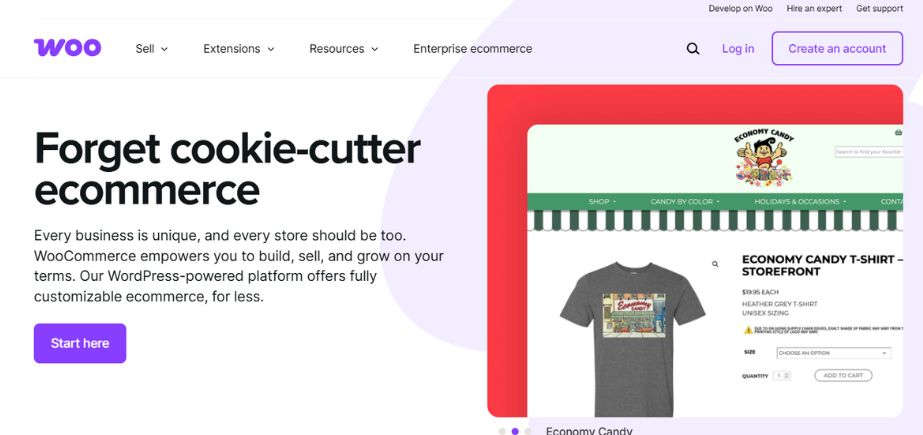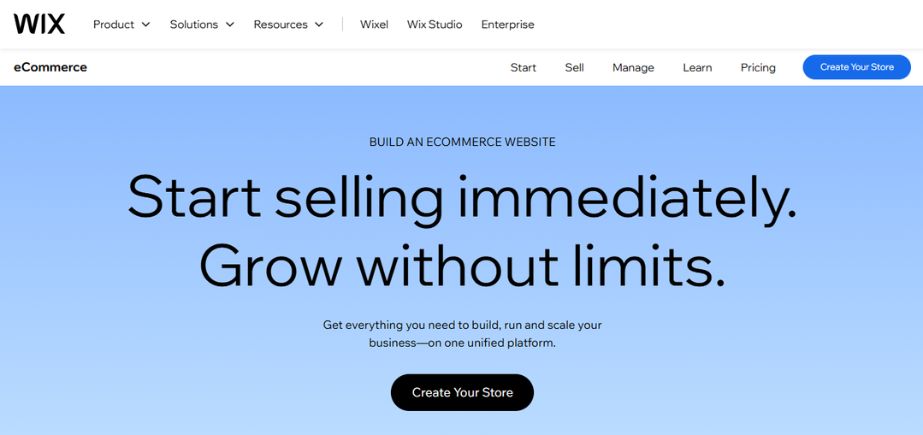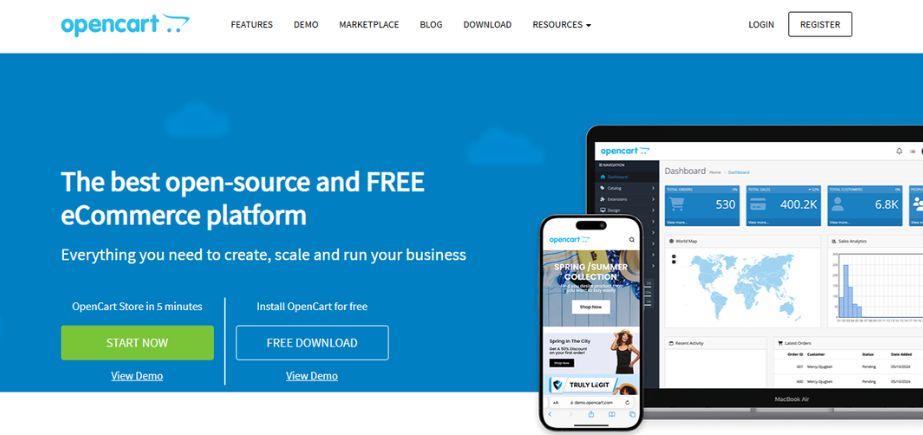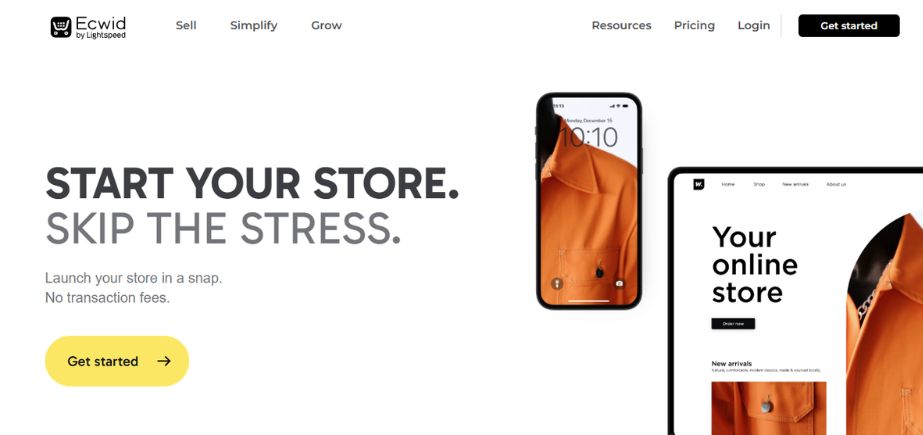Anyone beginning or growing an online business needs to pay close attention to which e-commerce platform they choose. You might find that Shopify isn’t right for you, as price, how much you can modify or a set of special features could be the issue. For this reason, it’s important to investigate other e-commerce platforms. People like these include developers, designers, marketers and simple business owners who use these platforms. All of these tools are good for different things depending on what your business is trying to achieve.
The criteria used to choose these 10 Shopify alternatives are ease of use, how easy they are to customize, the cost, how well they can handle growth, security, ability to accept payments, SEO support, support for customers, how well they work on mobile and how compatible they are with third-party apps. These platforms are great for starting a dropshipping business. When one understands the differences between e-commerce solutions, they can choose a platform that will serve their business best over time.
About Shopify
Shopify is an online platform that helps individuals and businesses quickly set up, run and expand their stores. Since 2006, Shopify has earned a reputation among entrepreneurs for being easy to use, offering custom themes and having many helpful apps. It offers product management, safe payment options, monitoring of stock, and SEO and allows selling through Amazon, Facebook and Instagram.
Launching a professional store is possible for anyone with hosting and customer support available at all times. Shopify is equipped with advanced tools such as abandoned cart recovery and analytics which benefit both beginning startups and established big businesses.
Criteria for Selecting the Best Shopify Alternatives
Let’s look at what matters most when selecting the top Shopify alternatives.
- Ease of use: Beginners should have a simple time using the site which should include drag-and-drop builders and intuitive navigation.
- Customisation features: A good e-commerce platform should offer many themes and allow you to adjust the look and workings of your store.
- Prices and fees: Figure out what you need to pay such as subscriptions, transaction prices and extra costs.
- Features and scalability: Built-in tools for inventory, marketing and SEO should help your business whether it stays small or develops over time.
- Payment modes: Your service should support popular payment methods and transact worldwide.
- Security: Company data is best protected by using SSL, adhering to PCI compliance and secure methods for payment processing.
- Customer support: Check for platforms that assist you fast with live chat, email, call and plenty of easy-to-use resources.
- Third-party integrations: Think about whether the platform works with other programs related to marketing, shipments and customer relations.
- Responsive mobile design: People should be able to use your store without issues on phones or tablets.
- SEO and marketing tools: Improved visibility and traffic should be the focus of SEO and marketing tools that you consider.
List of Top 10 Shopify Alternatives
1. WooCommerce

WooCommerce is one of the Shopify alternatives allows you to use your WordPress website as a customizable online store without spending any money. Those who don’t have much experience with WordPress may struggle, but WordPress fans will find extensive options to make their store more efficient. Since they control design and features, users can take care of inventory, set up payment methods and boost their SEO easily. WooCommerce makes it possible to sell physical products, digital products and subscriptions. Since it is flexible, it works well for small organizations as well as big companies. Though you will need some technical skills, it is still the most cost-effective solution for anyone who wants a customized e-commerce store.
Key Features:
- Seamless integration with WordPress
- Wide range of themes and plugins
- Flexible product and order management
- Built-in support for popular payment gateways
- Strong community and developer support
Pros:
- Free to use and highly customizable
- Wide ecosystem of extensions
Cons:
- Requires WordPress knowledge
- Hosting and domain not included
Pricing:
Free (hosting and premium extensions extra)
Who should use it?
Businesses already using or comfortable with WordPress looking for a customizable e-commerce solution.
2. BigCommerce

The platform BigCommerce is purpose-built for companies as they scale and expand. You get shopify SEO tools, support for product management, analysis features and the ability to sell goods on Amazon and Facebook. It is widely used because it allows businesses to grow rapidly without losing any speed. BigCommerce helps you use multiple payment gateways and provides template designs that are easy to change. It is designed to work with major CMSs like WordPress. Even with monthly payments, the many helpful features and assistance from BigCommerce make it a choice of note for businesses interested in growth.
Key Features:
- Multi-channel selling (Amazon, eBay, Facebook)
- Built-in SEO and analytics tools
- No transaction fees on any plan
- Customizable themes and templates
- Strong inventory management
Pros:
- Scalable for growing businesses
- Rich built-in features
Cons:
- Learning curve for beginners
- Higher cost than some alternatives
Pricing:
Starts at $29/month
Who should use it?
Medium to large businesses seeking a robust, scalable e-commerce platform.
3. Wix eCommerce

Wix eCommerce is designed so that anyone can simply drag and drop elements to design their online shop. Small to medium-sized businesses can use its custom templates, payment safety measures, image galleries for products and tools to keep track of their inventory. Wix makes it possible to promote both digital and physical products and have multiple payment gateways. Since coding isn’t needed, the site is perfect for beginners to use. Although developers may find it lacks sophisticated tools, it’s great for web creators who are seeking a clean and flexible layout. SEO and marketing tools are available on Wix to help your website get discovered.
Key Features:
- User-friendly interface
- Mobile-optimized templates
- Secure online payments
- Inventory and order tracking
- App marketplace for added functionality
Pros:
- Easy to set up and manage
- Great design flexibility
Cons:
- Limited scalability for large stores
- Restricted customization options
Pricing:
Starts at $27/month
Who should use it?
Beginners and small businesses looking for a simple and stylish e-commerce solution.
4. Squarespace

Squarespace builds websites that are stylish and offer advanced e-commerce tools. Thanks to its beautiful templates, it works especially well for creative and small business users. Users of Squarespace can sell products, enable digital downloads, offer subscriptions and handle payments using Stripe, PayPal or Apple Pay. There are tools for poop inventory tracking, price reductions, and sending emails, plus it has integrated SEO features included. Since it does not include every e-commerce option of bigger sites but is straightforward and good-looking, Small Business is the preferred choice for artists, small retailers and people starting an online business.
Key Features:
- Award-winning design templates
- All-in-one platform (hosting + e-commerce)
- Integrated analytics
- Mobile optimization
- Subscription and digital product support
Pros:
- Beautiful and responsive designs
- Easy to use and maintain
Cons:
- Limited payment gateways
- Less suitable for large product catalogs
Pricing:
Starts at $25/month (Business Plan)
Who should use it?
Creative professionals and small businesses focused on brand aesthetics.
5. Magento (Adobe Commerce)

Adobe Commerce was previously known as Magento and is popular with developers and enterprises because it is powerful and open-source. Because it is so customizable and scalable, businesses can create advanced, feature-full online stores. This e-commerce platform makes it easy to run several stores, ship worldwide, organize inventory and combine with various third-party services. Since Magento requires both advanced knowledge and much server capacity, it is an excellent solution for businesses with interesting needs and large numbers of products. Magento provides users with strong analytics, support for SEO and very reliable security. Enterprise e-commerce prefers it because it adapts easily to large numbers of users.
Key Features:
- Advanced product management
- Multiple language and currency support
- Highly customizable with developer tools
- SEO and marketing tools
- Scalable infrastructure
Pros:
- Extremely flexible and powerful
- Supports large-scale operations
Cons:
- Requires technical knowledge
- High development and maintenance cost
Pricing:
Free for open-source; enterprise pricing varies
Who should use it?
Large businesses with technical teams or budgets for developer support.
6. Weebly

Using drag and drop, Weebly lets you make a website that offers online sales. Being operated by Square, it mainly helps small businesses and those with little or no technical knowledge. Weebly features custom templates, secure online payments, an inventory system and lets users manage their business through email marketing and improving their SEO. The system handles physical goods, and digital items, connects to Square’s paying system and is easily accessed from mobile devices. Even though it is not as featureful as others, its simple operation, low cost and reliability attract users just starting an online store.
Key Features:
- Simple drag-and-drop builder
- Inventory and order management
- Mobile-optimized templates
- Built-in SEO tools
- App integration
Pros:
- Very easy to use
- Affordable pricing
Cons:
- Limited advanced e-commerce features
- Customization options are basic
Pricing:
Starts at $10/month (for eCommerce)
Who should use it?
Small businesses or individuals new to online selling.
7. Prestashop

PrestaShop is open-source and free e-commerce software best suited for those businesses that need total control over the store online and looking for Shopify alternatives. While it demands some technical know-how, it is very flexible in terms of theme and module customization. It can handle multiple currencies and languages and is therefore extremely suitable for international vendors. The admin panel is simple with which the user can manage products, orders, payments, and customer relationships. It also supports default payment gateways and shipping providers. With its large developer community and full marketplace, PrestaShop is a growth business solution with scalable costs for cheap and flexible web shop requirements.
Key Features:
- Open-source and fully customizable
- Multi-language and multi-currency support
- Comprehensive admin dashboard
- Wide selection of add-ons and themes
- SEO and marketing tools built-in
Pros:
- Free to use with no transaction fees
- Scalable and flexible
Cons:
- Requires technical setup and maintenance
- Some add-ons can be costly
Pricing:
starts at €24/month
Who should use it?
Small to medium businesses that want a customizable, self-hosted online store without platform-imposed transaction fees.
8. OpenCart

OpenCart is a platform that lets tech-friendly shop owners make significant custom modifications. Users get multi-store handling, a range of shipping options and numerous payment methods, along with a large store for theme and extension purchases. You can handle products and orders easily through the admin interface and the platform also lets you customize your SEO settings. Despite its lightness and speed, you need to know how to install, take care of and scale OpenCart. It works best for people able to take care of their server and update issues. The platform is suited to businesses that want to use an inexpensive, flexible and user-controlled e-commerce platform.
Key Features:
- Multi-store and multi-language support
- Large extension marketplace
- One-page checkout
- Product and customer management tools
- Built-in SEO and marketing tools
Pros:
- Free and open-source
- Flexible and customizable
Cons:
- Not beginner-friendly
- Requires manual maintenance and updates
Pricing:
Free (hosting and extensions extra)
Who should use it?
Developers or businesses needing a flexible, self-hosted solution.
9. Ecwid

With Ecwid, shop owners can quickly set up a store and place it on their current website, blog or social networks. Small businesses can start selling online right away on WordPress, Wix or Facebook, thanks to Grove’s range of platforms. Ecwid helps businesses easily connect their product listings, basic shopping carts and safe payment gateway. Furthermore, it provides a design that fits mobile screens, allows multiple languages and handles automated taxes. If a merchant wants to offer online sales but not update the whole website, Ecwid’s freemium and premium features are both easy and cost-effective solutions.
Key Features:
- Embeddable on any site
- Social media and marketplace integration
- Secure checkout
- Mobile point-of-sale support
- Real-time shipping and inventory tracking
Pros:
- Easy integration with any site
- Affordable for small businesses
Cons:
- Limited design customization
- Fewer advanced features
Pricing:
Free plan available; paid plans start at ₹450/month
Who should use it?
Small businesses looking to add e-commerce to an existing site.
10. Shift4Shop (formerly 3dcart)

Shifft4Shop was built to support businesses of all types and sizes in their e-commerce activities. It provides strong features with advanced SEO help, a blog included, unlimited products and support for more than one hundred payment methods. Users can edit content with drag & drop and pick from customizable design templates along with secure payment options. The powerful tools behind it handle complex inventories and repeat billing and allow businesses to sell across multiple channels. For people just starting up in the U.S. with Shift4 Payments, the free plan of Shift4Shop is a top choice. Though using the platform can take some getting used to, it’s a perfect fit for merchants who wish to control every part of their store and online growth.
Key Features:
- No transaction fees
- Customizable templates
- Built-in SEO and marketing tools
- Secure payment gateway (Shift4)
- Multi-channel selling support
Pros:
- Rich feature set with zero transaction fees
- Free plan available with Shift4 payment gateway
Cons:
- Interface is less modern
- Customer support can be inconsistent
Pricing:
Free with Shift4 payment processing; premium plans start at $39/month
Who should use it?
Businesses wanting a cost-effective and feature-rich e-commerce platform.
Comparison Between Different Shopify Alternatives
Following is the comparison table between different shopify alternatives:
| Platform | Key Features | Pricing (Starting) | Ideal Use Cases | Website |
| WooCommerce | Open-source, WordPress integration, highly customizable, vast plugin support | Free (hosting extra) | WordPress users, blogs turning into stores | woocommerce.com |
| BigCommerce | Scalable, no transaction fees, multichannel selling, built-in SEO | $29/month | Mid to large businesses scaling rapidly | bigcommerce.com |
| Wix eCommerce | Drag-and-drop builder, templates, mobile-ready, integrated tools | $17/month (Business Basic) | Small to medium online stores and creatives | wix.com/ecommerce |
| Squarespace | Stunning templates, built-in SEO, analytics, user-friendly | $25/month (Business Plan) | Creatives, portfolios, small e-commerce sites | squarespace.com |
| Magento | Advanced customization, large catalog support, multi-language/currency | Free (Open Source) / Custom (Adobe Commerce) | Enterprises needing deep custom features | adobe.com/magento |
| Weebly | Simple UI, drag-and-drop, Square integration, good for local selling | $10/month (Pro Plan) | Beginners, physical stores going online | weebly.com |
| Prestashop | Built-in CRM, SEO, mobile app, reporting tools | €24/month (Personal Plan) | Small to medium businesses | prestashop.com/ |
| OpenCart | Free, open-source, extension marketplace, multi-store support | Free (Hosting extra) | Developers, businesses seeking full control | opencart.com |
| Ecwid | Plug-in style, integrates with any website, POS support | Free (Basic) / ₹450/month | Small businesses adding stores to existing sites | ecwid.com |
| Shift4Shop | Free for U.S. users with Shift4 payment, built-in SEO, no transaction fees | $39/month (Free with Shift4 Payments) | Cost-conscious sellers, SEO-focused users | shift4shop.com |
Conclusion
In 2025, e-commerce customers will have multiple alternatives to Shopify. You can choose between Sellfy or Big Cartel if you want to sell online for next to no cost. If you need both extensive change and powerful scaling, either WooCommerce for WordPress or Magento is the right solution. Larger companies might choose BigCommerce since its all-in-one features mean you don’t need to add outside applications. Both designers and creative people will find these tools excellent for enjoying a smooth and flexible way to get their work done on the Internet. Ecwid allows people using it for online shopping to manage their stores on social networks as well as on their websites. Many people notice that Shift4Shop gives access to advanced features without charging too much. The choice of a professional platform comes from your expertise, budget, and future goals. If your passion for photography starts as a hobby, a simple digital camera will suit you, but when you expand your business, you need a system with many choices and options.
FAQs
1. Which Shopify alternatives are the easy to operate for people who are just starting out?
The reason Wix and Squarespace are helpful for beginners is that users can easily move items around, set everything up fast, and select from many readymade templates. App builders are designed for users and don’t involve any coding skills.
2. What should large businesses or businesses that are growing choose?
Large or quickly growing companies will find BigCommerce and Magento useful. They come with powerful tools, easy ways to customize, and the ability to grow with increased traffic and transactions.
3. Am I allowed to offer digital products for sale through Shopify alternatives?
Both Sellfy and WooCommerce are excellent options for anyone selling digital products. They make use of features that ensure files are transmitted safely, allow for managing licenses, and lower the need for keeping inventory on hand.
4. Are there any free Shopify alternatives?
Big Cartel allows you to sell up to five products with its free plan. If you have a WordPress website, WooCommerce is absolutely free, although it may cost you for hosting and plugins.
5. Is there a better choice for conducting multichannel selling between platforms?
Multichannel selling is easy with Ecwid since it can be used on your site, Facebook, Instagram, and even Amazon and eBay.

